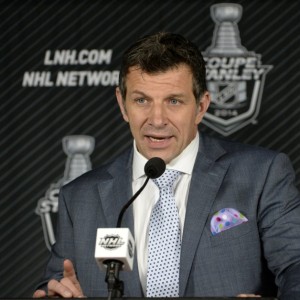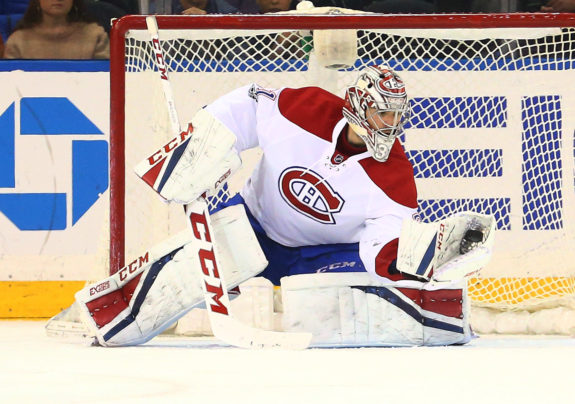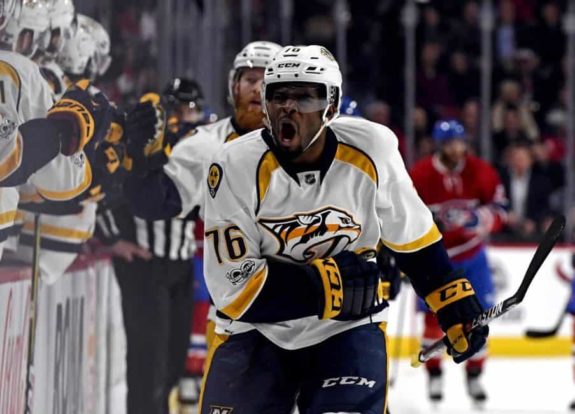Montreal Canadiens general manager Marc Bergevin takes a lot of heat. Some times without just cause. This, one day after he re-signed Carey Price to an eight-year, $84 million extension, is one of those times.
Bergevin’s Perspective

From Bergevin’s perspective, this was unavoidable. Unless he had planned to trade his star goalie, he was always going to pay Price a boatload of money once his contract was over. Well, trading him seems out of the question now, as the contract, which kicks in at the start of the 2018-19 season, comes with a $10.5 million cap hit.
That is a lot and is sure to diminish interest in many teams who may have at one point thought of enquiring about acquiring, arguably speaking, the best goalie on the planet.
Here’s the thing, though… one team out there was going to give Price this kind of money. If you’re Bergevin, you have no choice but to be the unlucky general manager to be saddled with this contract (or not, if he’s dismissed before it comes into effect). In spite of trying to consistently play his cards close to his vest and get people to “expect the unexpected,” he had made it abundantly clear that this extension was in those very same cards.
He may say he doesn’t believe in windows, but his team’s is coming to a close shortly. Ironically, it closing will probably coincide with the point at which the deal kicks in. It goes without saying, but $10.5 million is a big chunk to devote to one player, especially a goalie who is 30 years old now and will be 31 by the time he starts earning his new salary.
Price Gets Paid

Following the ill-advised Karl Alzner signing, that won’t leave a lot of cap space come the start of the 2018-19 season. So, why couldn’t have Price taken less to help the team out and make it easier for Bergevin to build a winner?
Well, for starters, Bergevin has had ample time do that with many of his stars under cost-effective deals. Excluding a trip to the Eastern Conference Final in 2014, which was made a reality in large part by performances from P.K. Subban and Price, he hasn’t delivered. It goes without saying, but with Subban gone, he needs Price to stay in the fold.
Secondly, the onus is not on Price to take less. As one of the best players in the game, he deserves to be paid like it. Furthermore, one could instead argue why can’t other free agents take less in order to come here and play in front of Price?
Granted, there are high taxes, the language issue and an overzealous media, and the likeliest candidate to be willing to take less is a guy who has played his entire decade-long career here. Two points remain, though.
- Considering Edmonton Oilers forward Connor McDavid is reportedly in the process of negotiating a long-term cap hit in excess of $13 million, it could have been worse.
- The onus is instead on the organization itself to make this a place players want to come to and then stay.
Bergevin’s Silver Linings Playbook
With regard to No. 2, Price obviously wants to stay. That should be somewhat celebrated, not bemoaned. Meanwhile, even though it will be harder to attract free agents to Montreal from here on out, there is a silver lining. In spite of what at times seemed like their best efforts not to, the Canadiens will be forced to turn to the young guys from within.
That means legitimate shots to the likes of Charles Hudon, Nikita Scherbak and Noah Juulsen. A management group that has claimed that it’s important to build through the draft now has no choice but to do just that and milk every entry-level and bridge contract for all that it’s worth, up until the salary cap increases to more manageable levels.
Since it just increased a mere $2 million to $75 million for next season, it could take a while, especially with Max Pacioretty due for a massive raise himself in a few years.
Of course, a Price cap hit closer to New York Ranger Henrik Lundqvist’s $8.5 million would have been more sustainable, but, if $10.5 million is good enough for Chicago Blackhawks Patrick Kane and Jonathan Toews, Price is worth that much too, at least for now. And the Blackhawks seem to be doing all right from year to year. So, managing the cap from here on out should be hard, but not impossible.
Trading Price Not an Option
Trading Price may have been much more palatable to many fans, because such a hypothetical scenario seemed to better serve the team’s long-term health. That was never going to be an option for Bergevin, who would have become the guy who traded away both a Vezina/ Hart Memorial Trophy winner and a Norris Memorial Trophy winner.

Considering he traded away Subban for Shea Weber, who’s four years older, the writing that this team was going to go for it has been on the wall for a while. Price being here is a big part of that. Price being happy may be an even bigger part. Without negotiations looming over his or management’s head, he’s probably at his happiest, especially with the outcome.
Bergevin has just been doing his job, honoring his mandate to make this team a winner to the best of his ability. You can despise many of his moves and methods, but no one should be surprised. And, because of Bergevin’s limited options, it’s hard to dispute that this extension was the best outcome possible.
He was likely going to move heaven and Earth to make it happen. He now has no choice but to navigate through cap-management hell or make way for his successor. That’s what he signed on for as well. That may be the biggest silver lining of all. He has no choice but to turn this thing around or face the music. His hands are now more tied than ever.